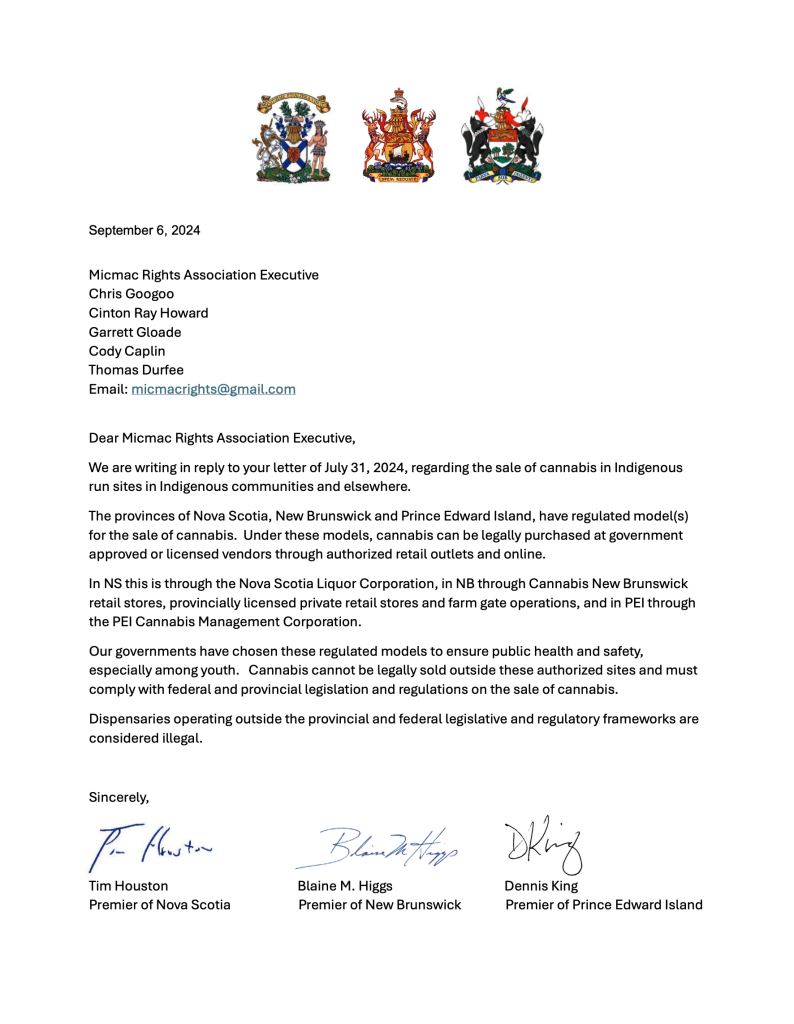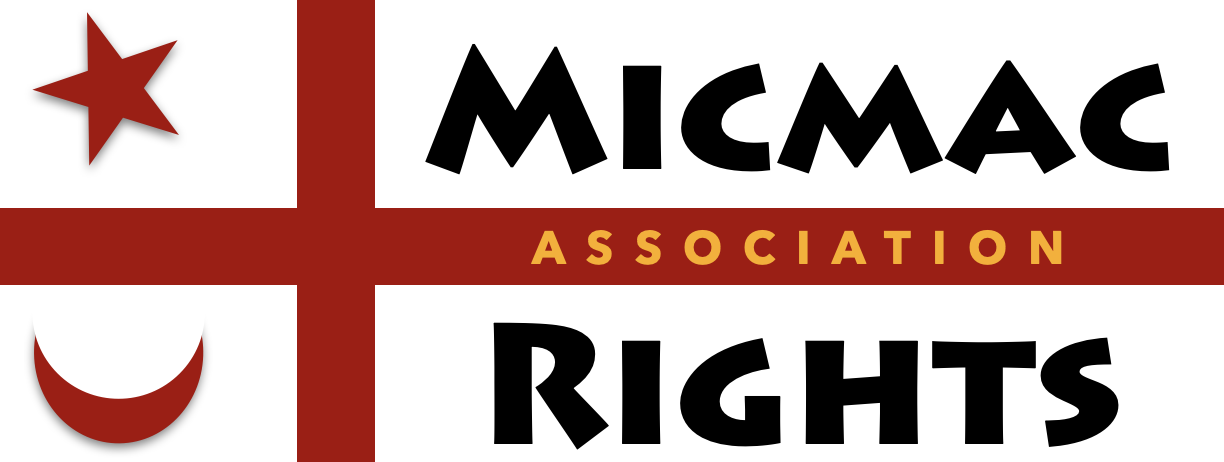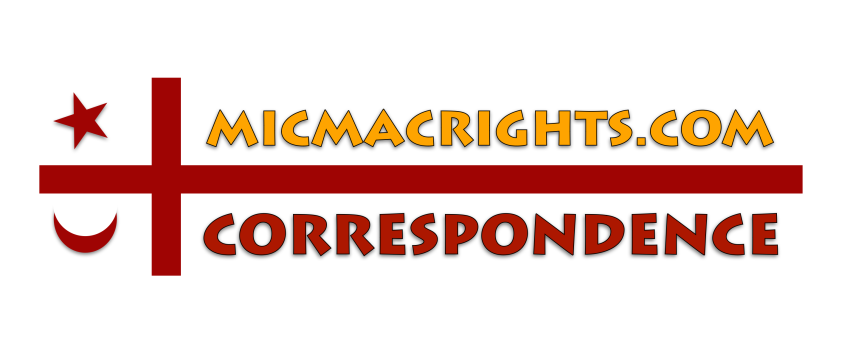On September 6, 2024 the Micmac Rights Association received a letter from the Premiers of Nova Scotia, PEI and New Brunswick in response to our letter of July 31st, 2024. The did not address the substantive issues of Mi’kmaq Aboriginal and treaty rights raised in the MRA letter. The full letter from the Premiers is reproduced below and is available as a PDF here.

On Sept 16, 2024 the Micmac Rights Association wrote back to the Premiers as follows: PDF Version here.





Sept 16, 2024
Dear Premiers Houston, Higgs, and King,
We thank you for your letter of September 6th, 2024 acknowledging our letter of July 31st 2024, which provided you with a list of the operating Mi’kmaw truckhouses recognized by our Indigenous Governing Body, the Micmac Rights Association, to have the lawful right to retail cannabis in Mi’kma’ki (which includes what you call the provinces of Nova Scotia, New Brunswick and PEI) in accordance with our individual and collective Section 25 and 35 constitutionally protected Aboriginal and treaty rights.
Given your oath of office and professed willingness as elected Canadian leaders to uphold Canada’s constitution, we find it unfortunate that you did not choose to address the issues we raised with you in our letter. Given the context of the provincially directed raids on over a dozen Mi’kmaw trading posts in the past three months, and the recent murder of Steven “Iggy” Dedam by RCMP officers on Sunday Sept 8th, we believe that a frank, open, and substantive conversation about our sacred treaty relationship is required in order to “polish” the Covenant Chain between us which has grown tarnished and strained.
In hopes of remedying this situation, we wish to draw your attention to some very important direction given to the Provincial leaders such as yourselves by the Supreme Court of Canada in a unanimous decision issued on July 26th, 2024 in Ontario (Attorney General) v Restoule, 2024 SCC 27. The matter at law related to the failure of the Province of Ontario to uphold the terms of the Robinson-Huron and Robinson-Superior Treaties. The following are some excerpts from the Supreme Court’s decision:
- “There is a strong public interest in reconciliation between Indigenous Peoples and the Crown. Indeed, this Court has conclusively determined that reconciliation is the fundamental purpose of section 35 of the Constitution Act, 1982. This Court has also repeatedly found that negotiation, rather than litigation, is better suited to achieving true reconciliation.”
- “In First Nation of Nacho Nyak Dun v. Yukon, this Court held both that (a) courts play a critical role in safeguarding treaty rights, and (b) courts should exercise judicial restraint to ensure that they “generally leave space for the parties to govern together and work out their differences.” While that statement was made in relation to a modern treaty, similar principles apply here, where a historic treaty obligation has been ignored by the Crown for over a century. In these circumstances, reconciliation requires the parties to turn their minds together to the task of renewing their relationship. The object is to achieve a respectful and mutually beneficial process and outcome to give effect to the core of the treaty right.”
- “This Honourable Court’s guidance is not needed on the question of whether the Crown has an unfettered discretion in deciding how to implement treaty promises or Aboriginal and treaty rights generally. This Court has already determined that the honour of the Crown governs treaty making and implementation, and requires the Crown to act in a way that accomplishes the intended purposes of treaties and the solemn promises it makes to Indigenous Peoples. This duty cannot coexist with an unfettered and unreviewable discretion on the part of the Crown.”
- “In Marshall, Justice Binnie noted the long pedigree behind the principle that the honour of the Crown attaches to the performance of the Crown’s treaty obligation, starting with Justice Gwynne’s decision in 1895 that the faith and honour of the Crown is pledged to the fulfillment of treaty terms. In Badger, this Court held that treaties involve the exchange of “solemn promises,” that they are agreements whose nature is “sacred,” and that the honour and integrity of the Crown is at stake in considering treaties. In Mikisew Cree, this Court held that “the honour of the Crown infuses every treaty and the performance of every treaty obligation.” More recently, in Manitoba Metis Federation, this Court held that the honour of the Crown requires a purposive approach to the implementation of treaty rights. These principles are now settled beyond any reasonable dispute.”
- “An honourable Treaty partner does not wait for courts to compel it to take action to remedy historical breaches.”
We trust that in reading this Supreme Court decision you will gain a better understanding of your fiduciary responsibilities to us as loyal servants to the Crown in your respective provinces.
We are not telling you that you may not have cannabis stores on our land – even though you failed to consult with our people and our nation about your decision to do so, and your stores and cannabis governance regime bring no benefit to our people. What we are saying is that we have the right to our own independent economy. Canada itself “recognizes and affirms” that right through Section 35 of the Constitution Act 1982, the United Nations Declaration on the Rights of Indigenous People Act and through Article 4 of the Treaty of 1752, which remains in effect today, is “recognized and affirmed” by Section 35 of the Constitution, and states that we Indians shall “have free liberty to bring for Sale to Halifax or any other Settlement within this Province, Skins, feathers, fowl, fish or any other thing they shall have to sell, where they shall have liberty to dispose thereof to the best Advantage.”
As Canada’s Supreme Court just made clear, you – as loyal servants of the Crown in its provincial administrative units – do not have an “unfettered and unreviewable discretion” to interpret or decide our treaty rights for us. We therefore wish you to directly communicate with us and commit to a process of reconciliation by negotiating a peaceful and mutually beneficial solution to the conflict we have been having due to your infringement of our members’ constitutionally protected Aboriginal and treaty rights. If you will not meet, will you at least commit to no longer molesting or disturbing the Mi’kmaw trading posts we have identified to you as recognized by us and which are adhering to the community standards regulatory regime of the Micmac Rights Association?
Should you be reluctant to meet with us because of your commitments to the Indian Act Band Councils and Indian corporate bodies with whom you do so much business, let us remind you that those are your own organizations, created by your own laws, and funded by your own governments. Indian Act band councils do not hold Aboriginal and treaty rights. We do. We are Mi’kmaw. We are constituted by our own laws, not yours. We carry ourselves and we fund our own Indigenous Governing Body ourselves without any government funding. We are sovereign people living on our own unceded lands in a Covenant Chain of Peace and Friendship treaties made with your Crown which go back to 1725 and the arrival of your ancestors on our shores. We have constitutionally protected Aboriginal and treaty rights, and we use them all the time.
The Micmac Rights Association (MRA) is an Indigenous Governing Body which the Government of Canada defines as “a council, government or other entity that is authorized to act on behalf of an Indigenous group, community or people that holds rights recognized and affirmed by section 35 of the Constitution Act, 1982.” The sovereign Mi’kmaw people gathered together at a duly convened biannual meeting of the Micmac Rights Association on March 9th, 2024 in Millbrook First Nation authorized the MRA to act on their behalf and recognized and affirmed the MRA as an Indigenous Governing Body for its members.
We thank you for your attention to this matter. We look forward to a substantive response from you and to meeting together to resolve these important issues. We suggest that the most appropriate place for you to meet with us to discuss the issues tarnishing our treaty relationship is at the Treaty Day gathering on October 1st, 2024 in Halifax which is held yearly as per Article 8 of the treaty for the purpose:
That to Cherish a good Harmony & mutual Correspondence between the said Indians & this Government, His Excellency Peregrine Thomas Hopson Esqr. Captain General & Governor in Chief in & over His Majesty’s Province of Nova Scotia or Accadie, Vice Admiral of the same & Colonel of one of His Majesty’s Regiments of Foot, hereby Promises on the Part of His Majesty, that the said Indians shall upon the first day of October Yearly, so long as they shall Continue in Friendship, Receive Presents of Blankets, Tobacco, and some Powder & Shot; and the said Indians promise once every Year, upon the first of October to come by themselves or their Delegates and Receive the said Presents and Renew their Friendship and Submissions.
If you are unavailable to meet on Oct 1st in Halifax, let us know as to your intentions and schedules and we shall be willing to meet with you elsewhere if necessary.
On behalf of the Micmac Rights Association,
Chris Googoo, Clinton Ray Howard, Garrett Gloade, Cody Caplin, Thomas Durfee.

